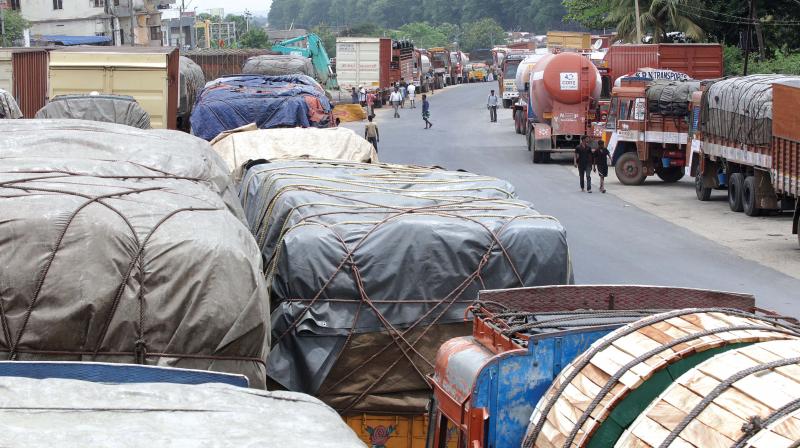GST won't push prices up
Thomas Isaac says GST rates have been fixed at lower than the existing VAT rates and hence prices need not go up on once GST comes into force.

THIRUVANANTHAPURAM: Finance minister Dr T.M. Thomas Isaac estimates that there could be a reduction of at least Rs one lakh crore in the amount of taxes paid in the country under the goods and services tax (GST) regime. “The savings could go up to even Rs 1.5 lakh crore,” Dr Isaac said. “For almost all commodities, GST has been fixed below their existing tax rate. Therefore, there is no reason whatsoever for prices to go up after the GST is in place,” Dr Isaac said. However, the nagging concern is whether big corporates, manufacturers and traders will pass on the benefits to the end consumer.
“We are aware of the crafty moves by distributors and manufacturers to increase their margins by keeping the GST gains all for themselves,” the minister said. Cement manufacturers, for instance, have already hiked prices so that they could bring down the prices once GST comes into force and look ethically correct. To preempt profiteering, the taxes department will publish an exhaustive list of commodities, their prices under the existing tax structure, and what their new prices should be under the GST. “This will give us a clear idea of who are passing on the benefits and who are not,” Dr Isaac said.
An anti-profiteering clause has also been included in the GST Act. The Anti-Profiteering Authority, set up under the clause, has been empowered to call up corporate houses and trade bodies if it has been found that their commodity prices have not reflected the change in the tax regime. The Authority can even cancel the registration of a company if they remain intransigent,” the finance minister said.
BIG GAINS FOR STATE
Dr Isaac said there were two reasons why the GST would improve the state’s revenues. One, Kerala is a consumer state and the GST is a destination-based tax. “Even if you buy things from outside the state, the tax has to be paid here unlike earlier when the tax was paid at the point of sale,” Dr Isaac said. Tax from online sales will also accrue to the state. The minister said those purchasing items from outside the state should demand not just bills but also that their address be incorporated in the bills so that the tax finally gets deposited in the state’s coffers. This is why the finance department has begun a new campaign ‘Ask for Bills, Ask to add your address on the Bills”.
The second reason why GST is beneficial for the state is the inclusion of services. “Kerala has a high density of telecommunication, banking, financial and insurance services from which the state had not benefited in the past,” Dr Isaac said. He said that the GST regime could increase tax revenue growth by 20 per cent. “During the last three years, the growth was only 10 percent. We hope that in two years, the growth will be 20 per cent,” he said. Two slabs for lottery sales, Dr Isaac said, would protect the state-run lotteries. “The imposition of 18 per cent GST on lotteries run by middlemen, and only 12 per cent on state-run lotteries, would dampen the demand for other-state lotteries,” the minister said.
WHERE GST WILL HURT
Here is one area where consumers in Kerala would be impacted hard. Eating out. The state has the largest number of hotels in the country. Dr Isaac said that at the moment eating out in restaurants with a turnover of less than Rs 60 lakh was taxed at 0.5 per cent. Under GST, the tax would be 5 per cent. Classical preparations in Ayurveda, which again is popular among Malayalis, have also been taxed higher. At the moment, the total incidence of taxes is only 7 per cent. Under GST, it will be 12 percent.
“We want Ayurveda to be taxed on a par with modern medicine formulations (which are taxed at 5 per cent),” Dr Isaac said. The houseboat industry, too, could be affected as it will be taxed at 18 per cent. Dr Isaac, however, said that hotel industry, which has been included in the 28 per cent luxury category, would not be affected. “Already the various taxes on the industry, including luxury and service and excise taxes, together impose more than 28 per cent tax. Under GST, they gain,” Isaac said.
FUTURE OF CHECK POSTS
Sales tax check posts as we know them in Walayar and Amaravila will cease to exist. However, during the initial stages, it will remain. This is because e-Way bills are not ready yet. e-Way bills are the ones automatically generated once a trader uploads an invoice. Any tax official, sitting in any part of the country, can access it. The system, however, requires more time to get going. Till then, as usual, those entering the state with goods should produce the declaration at the checkpost. “But there will be no waiting. The person transporting goods need only to show the declaration and need not wait for the approval. This will do away with the need for waiting in long queues,” Dr Isaac said. But once the e-way bill system is up and running, check posts will be emptied of staff. But because of their strategic location, these places will be mounted with surveillance cameras to capture the vehicles crossing the border. “The vehicle number is enough to throw open invoice details of the goods carried by these vehicles,” Dr Isaac said.

